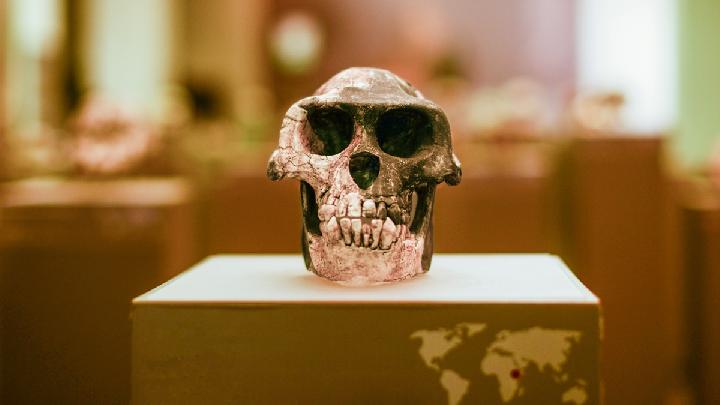October 22, 2025 | 11:27 am

TEMPO.CO, Jakarta - A recent study from Washington University in St. Louis has found new evidence that strengthens the theory that humans evolved from ape-like ancestors in Africa. The findings, published in the journal Communications Biology, re-examine the fossils of Ardipithecus ramidus, or "Ardi," a species believed to be the link between apes and humans.
Researchers re-evaluated Ardi's ankle (talus) and heel (calcaneus) bones. The measurements showed a 14.5-degree "talar angle"-the highest among all hominin fossils ever studied-and fell within the range of non-human primates like gorillas and bonobos. This indicates that Ardi had strong ankle for climbing yet was stable enough to support the body when walking upright.
Additionally, scientists found a groove for the big toe tendon and edged joint surfaces. This combination forms a characteristic that reflects a transitional lifestyle, a blend of tree-climbing and ground walking abilities. The findings indicate that Ardi was not entirely living on the ground, but no longer fully reliant on trees.
"One surprising aspect of this discovery is that Ardi walked upright, yet still retained many ape-like features, including the ability to grasp with its foot," said Thomas (Cody) Prang, an assistant professor of biological anthropology, as quoted in the Earth report on October 20, 2025.
According to the researchers, these findings correct the previous view that Ardi was too different from apes. They argue that Ardi's anatomy actually shows a balance between climbing and bipedal walking. This analysis also indicates that evolution did not occur randomly, but was the result of adaptation to the challenges of living in trees and on the ground.
"Based on their analysis, they conclude that modern African apes, such as chimpanzees and gorillas, represent an evolutionary dead end, not a step towards the emergence of humans," he added.
These findings challenge the long-standing view that humans evolved from a common tree-dwelling ancestor. Instead, this research suggests that the first humans may have originated from apes that were accustomed to living in two worlds, namely trees and the ground.
"There is no denying the importance of Ardi's discovery, of course, but many experts believe that the initial interpretations may have been mistaken. Therefore, this paper is a correction of the initial notion that distanced Ardi too far from chimpanzees and gorillas," said Prang.
Using 3D measurements and statistical analysis, the team found patterns that indicate a strong combination of vertical climbing ability and early bipedal walking form. They also noted the possibility of natural variations within the Ardipithecus population that later developed into more efficient bipedal abilities.
The authors emphasize that the evidence from Ardi's hands, feet, and ankles supports the 'ape-like African ancestor' model. This means that early hominins were likely still moving in trees like modern apes, but beginning to take the first steps towards bipedalism.
These findings do not imply that humans evolved directly from chimpanzees, but rather, that they shared a common ancestor that moved like modern chimpanzees. "These findings are both controversial and in line with what was originally anticipated."
Editor's Choice: 'Java Man' Fossils Set to Go on Display at Indonesia's National Museum
Click here to get the latest news updates from Tempo on Google News
Colombia Recalls Ambassador to the US Amid Rising Diplomatic Tension
13 jam lalu

Colombia announced the step after US President Donald Trump referred to President Gustavo Petro as an 'illegal drug leader'.
Trump Signs US$8.5 Billion Rare Earths Deal with Australia
23 jam lalu

Donald Trump & Australia's Anthony Albanese announced an agreement on rare earth minerals and expressed support for the AUKUS nuclear submarine deal
Millions of Americans Protest Against Trump in 'No Kings' Rallies: What's the Reason?
1 hari lalu

Millions of Americans took to the streets to protest against the authoritarian tendencies of President Donald Trump and the erosion of democratic norms under his government.
India Could Turn H1-B Visa Restrictions to Its Advantage
1 hari lalu

The tightening of H-1B visa programme for Indians through fees & potential policy changes challenges the established model of global talent exchange
Indonesian Shrimp Exports to US Resume Following FDA Dispensation
2 hari lalu

The US Food and Drug Administration (FDA) has allowed thousands of Indonesian shrimp containers to enter the US market.
The Green Paradox of Ethiopia's Renaissance Dam
2 hari lalu

Africa's largest hydroelectric plant is a source of national pride, but will Ethiopia's Renaissance Dam truly deliver power to the continent?
US Holding Survivors from 'Drug Boat' off Venezuela
3 hari lalu

Reports suggest the US has detained two individuals who survived an attack on their vessel in the Caribbean.
US Denies Israeli Claims That Hamas Complicated Hostage Return
4 hari lalu

The United States is denying Israeli claims that Hamas violated the ceasefire by failing to return all deceased hostages, the BBC reported.
Trump Ensures US Troops Paid Amid Government Shutdown
4 hari lalu

Donald Trump signed an order to ensure that military personnel continue to receive their pay during the ongoing 15-day government shutdown.
US Passport Falls Out of Top 10 Strongest Passports
6 hari lalu

The US passport is no longer among the top 10 most powerful passports in the world in the latest Henley Passport Index, for the first time in 20 years






























:strip_icc():format(jpeg)/kly-media-production/medias/5321271/original/035046300_1755668869-ong.jpg)
:strip_icc():format(jpeg):watermark(kly-media-production/assets/images/watermarks/bola/watermark-color-landscape-new.png,1125,20,0)/kly-media-production/medias/5343503/original/009674500_1757434237-20250909AA_Timnas_Indonesia_U-23Vs_Korea_Selatan-03.JPG)
:strip_icc():format(jpeg)/kly-media-production/medias/5118338/original/096777400_1738505541-20250202BL_Kedatangan_Patrick_Kluivert_dalam_Laga_Persija_Vs_PSBS_7.JPG)
:strip_icc():format(jpeg)/kly-media-production/medias/5390165/original/033586000_1761235850-Persib_Bandung_1.jpeg)
:strip_icc():format(jpeg)/kly-media-production/medias/5267951/original/037003100_1751185942-souza.jpg)
:strip_icc():format(jpeg)/kly-media-production/medias/5385175/original/090228500_1760881526-Bali_United.jpeg)
:strip_icc():format(jpeg)/kly-media-production/medias/5390103/original/004877800_1761227059-adam.jpg)

:strip_icc():format(jpeg)/kly-media-production/medias/5387623/original/017139800_1761069603-Persib_Vs_Selangor.JPG)
:strip_icc():format(jpeg):watermark(kly-media-production/assets/images/watermarks/bola/watermark-color-landscape-new.png,1125,20,0)/kly-media-production/medias/5233597/original/013085700_1748319472-IMG_9065.JPG)
:strip_icc():format(jpeg)/kly-media-production/medias/4605399/original/051919700_1696925599-Timnas_Indonesia_-_Arkhan_Fikri_dan_Hokky_Caraka_copy.jpg)

:strip_icc():format(jpeg):watermark(kly-media-production/assets/images/watermarks/bola/watermark-color-landscape-new.png,1125,20,0)/kly-media-production/medias/5348762/original/048902900_1757874102-Persija_Jakarta_vs_Bali_United-40.jpg)

:strip_icc():format(jpeg)/kly-media-production/medias/5387582/original/025954200_1761053138-selangor.jpeg)


:strip_icc():format(jpeg)/kly-media-production/medias/5390158/original/093322600_1761235520-eliano_dan_faisal.jpg)

